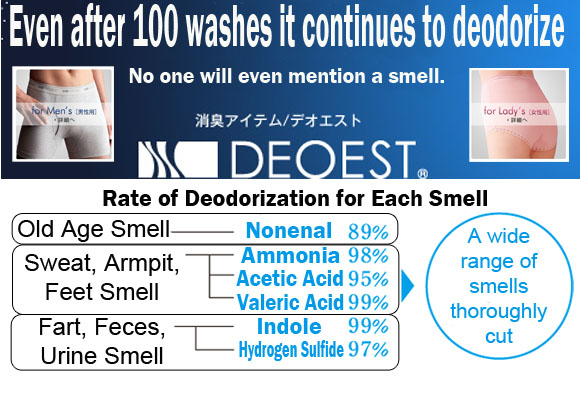
This story follows the creation of Inodore, a Japanese-made material that did something to stop not only fart smells, but a range of other body odors deemed “unpleasant” by society. This company has found a method to eliminate foul smells from the body without the use of any harmful chemicals or powerful perfumes.
Their clothing products currently on sale can trap and eliminate everyday body odors like sweat and gas by over 95%, 80% of which is erased in the first 30 seconds of contact.
Our story begins with Professor Hiroki Ohge of Hiroshima University who was studying how diseases can affect the smells of people’s farts. By analyzing a fart smell along with its key component, hydrogen sulfide, it could be possible to detect illnesses.
For example, conceivably, cancer could be detected by getting a butt smelled rather than getting a finger stuck up there.
While Prof. Ohge was studying in America he noticed that there were various cushions and shorts on sale that deodorize using activated carbon contained within. This type of carbon was like charcoal but had even more holes inside which could trap odor molecules as they passed through.
“It would be better if it wrapped tightly around the butt like underwear, then the smell wouldn’t escape through openings” thought the professor.
Upon returning to Japan Prof. Ohge shopped around the idea of a deodorizing fabric to 50 different textile companies. In the end, a manufacturer called Seiren in Tokyo showed interest and the two got down to work.
Activated carbon or charcoal wouldn’t be suitable because it was weak and could leave remnants eventually all falling out of the clothing. After some trial and error, ceramic material was chosen because it also had countless tiny pores but also was stronger and could hold up to wear and washing.
The ceramics used also contained metal ions which break down and eliminate the various odors emitted from the body. The ceramic material was reduced to nanoscopic particles and attached to the fibers of the underwear making them appear like regular garments.
With the fabric complete in 2008, Prof. Ohge and Seiren introduced it to the one place that would appreciate garments that killed unpleasant odors the most – a nursing home. The staff of the old age facilities responded favorably that this material indeed cut down the smell of feces considerably.
Pleased with the results they began developing further products for old age homes working on a variety of other odors like so-called “old people smell.” This distinct smell is simply a different form of body odor caused by a chemical called nonenal.
Despite its name, people of all ages can have this smell but it occurs in everyone usually after 40 years old. Although this is a completely different smell from farts, they were able to deal with it in the same way. According to Seiren Director Nobuyuki Imai, “by working with various combinations of ceramics we can deal with quite a wide range of odors.”
The material now marketed as Inodore has branched beyond special care facilities and smells into the corporate world with their Deoest line of clothing. Various undergarments have been developed to block embarrassing farts, awkward smelly feet, and career threatening pit stank.
Their goods have been well received by the public at large as well. One satisfied customer wrote on their website:
“Seeing it advertised on TV I thought I’d give it a try. I tried farting [in a pair of the underwear] as an experiment and I was truly shocked! The deodorant effect is outstanding!”
Prof. Ohge stresses the point that “many people are extra sensitive about their own smell. These products can help people to have more confidence.”
And so, we at RocketNews24 would like to salute the good professor for his hard work and Seiren for taking a chance on a revolutionary idea that may usher us all into a brave new odor free world – a world where we may all enjoy bean burritos without fear of persecution.
Source: Inodore via Mainichi Online (Japanese)
▼ A chart explaining how the fabric works, kind of.
▼ Our Savior, Professor Ohge